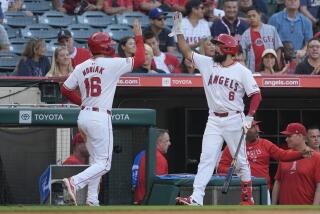Future Isn’t Now for Angel Pitching
- Share via
New Angel President Tony Tavares said the Walt Disney Co. is willing to increase the team’s $27-million payroll to acquire a starting pitcher, but not at the expense of the farm system’s top prospects.
“How many times can this organization give away good prospects to solve immediate problems?” Tavares said, gaining full grasp of an age-old Angel dilemma in his first week on the job.
“We did it last year, and you can see the history of it. You can’t strip yourself of prospects and remain competitive over the long haul. You can’t just keep sticking fingers in dikes. I’m very concerned about our pitching, but I’ve also got to be concerned with what happens three years from now.”
General Manager Bill Bavasi and Manager Marcel Lachemann, of course, are concerned with what is happening right now.
With Mark Langston on the disabled list and Scott Sanderson released last week, the Angels have tried to patch their rotation with minor leaguers and fringe major leaguers.
The results have been disastrous. The Angels have lost 12 of their last 15 games and have received only three decent starts from pitchers other than Chuck Finley since May 5.
In addition to Finley, the rotation includes Jim Abbott, off to the worst start (1-7, 6.39 earned-run average) of his eight-year career, Jason Grimsley, (0-3, 11.68 ERA in his last three starts), Shawn Boskie, who can be really good or really bad, and Shad Williams, who showed promise in his major league debut last Saturday but is an untested rookie.
And with middle reliever Mark Eichhorn on the disabled list, the bullpen has also sagged. Left-handers Mark Holzemer and Brad Pennington, a recent waiver-wire acquisition, and rookie Jeff Schmidt have been unable to stop opponents.
Lachemann said this week that the Angels have exhausted their starting pitching options within the organization.
So where do they go from here?
The trading block.
The Angels have expressed interest in San Diego’s Scott Sanders and Tim Worrell, Toronto’s Pat Hentgen and Erik Hanson, Houston’s Darryl Kile and Milwaukee’s Ricky Bones, but teams won’t part with good pitchers unless they get something good in return.
Aging closer Lee Smith is not exactly what teams have in mind. The Angels would love to dump Smith but won’t get a quality pitcher in return unless he is packaged with a top prospect or a major league position player.
A bidding war among pennant contenders will probably erupt over Kansas City right-hander Kevin Appier as the July 31 trading deadline approaches, and the Angels have expressed interest in the Royal ace, who makes $5 million and is a free agent after this season. Tavares wouldn’t rule out a deal for Appier but is wary of such a trade.
“I am very much against giving up young prospects for rent-a-pitchers,” Tavares said. “A better solution would be trading players at positions you have depth at. I’d rather trade equal value on the big league roster.”
Triple-A outfielder Darin Erstad, the No. 1 pick in the 1995 draft, catcher Todd Greene and third baseman George Arias, the organization’s top three prospects, attract plenty of interest, but can a system that has been stripped of many prospects in recent years absorb the loss of any of the three?
With triple-A right-handers Phil Leftwich and Pete Janicki trying to overcome arm problems, Jason Dickson, a right-hander who went 14-6 with a 2.86 ERA at Class-A Cedar Rapids in 1995 and was recently promoted to triple-A, and left-hander Jarrod Washburn of Class-A Lake Elsinore are the team’s top starting pitching prospects.
Both are attracting trade interest, but Finley (33) and Langston (35) are toward the end of their careers, and the loss of Dickson or Washburn could be a severe blow to the Angels’ projected rotation in two or three years. The Angels gave the Chicago White Sox four players for Abbott last July.
“Because of past moves, we can’t reach into the system to solve problems,” Tavares said.
More to Read
Go beyond the scoreboard
Get the latest on L.A.'s teams in the daily Sports Report newsletter.
You may occasionally receive promotional content from the Los Angeles Times.







